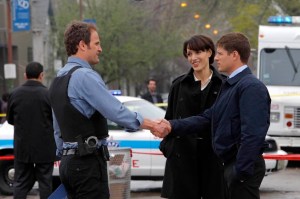
FOX
Ideally, TV critics should judge new shows without regard to whether they run on cable or broadcast TV. In practice, our insider-y knowledge of the differences and the tensions between the two creeps in. Arguably, some cable shows get a pass for recurrent themes—the brooding antihero, &c.—that are every bit as much as overused as cop procedurals are on CBS. Conversely, sometimes network shows get graded on a curve, or, like Fox’s promising but imperfect Lone Star, get praised for their daring where they might have been more unsparingly critiqued on cable.
But in the real world, people like TV shows or they don’t; they don’t force themselves to like them more out of sympathy for network constraints. With that in mind, The Chicago Code, Fox’s new police drama from Shawn Ryan (The Shield, Terriers), is a pretty good new series, the best newcomer in a not-too-hot broadcast season. It has some voice and verve, but it’s definitely no Shield yet—either in content or innovation—and like a new rookie on patrol, I’m putting it on probationary status for now.
Like The Shield (or, not to strain comparison, The Wire), Chicago Code (formerly called “Ride-Along”) is a police story that’s also about politics and corruption. (Chicago has lately regained its place as a handy shorthand for civic venality, on such popular entertainments as The Good Wife and The Glenn Beck Show.)
Here, new police superintendent Teresa Colvin (Jennifer Beals) has just taken office, and made a culture of shady deals and kickbacks her top priority. (Her dad, we learn in a flashback sequence, lost his business and had his life ruined because of the system of payoffs to crooks and tribute to bureaucrats.) She has few allies in this quest; one of them is former partner Jarek Wysocki (Jason Clarke), a plain-talking, practical-but-honest street cop from a family of them. And one of her biggest adversaries—and potential targets—is alderman Ronin Gibbons (Delroy Lindo), an old-school political boss who wears his sleek cynicism as comfortably as a $5000 suit.
Stylistically, The Chicago Code has a fair amount in common with ABC’s new Detroit 1-8-7, which has evolved into a cut-above-average procedural this season. Both shows are a kind of throwback to the cop series of the ’90s (Homicide, NYPD Blue), which focused on urban grit, social contexts and show leather more than the eye-popping forensics of their 21st-century followers like CSI. The Chicago Code is the more serial of the two shows, although its cops devote plenty of time to weekly cases and foot chases.
But also like Detroit 1-8-7, it has a refreshing regional specificity (there are a few obtrusive “This is how we do it in Chicago!” lines, but generally the cues are more organic) and it’s likewise well-cast. And yes, that’s including—even especially—Beals as an idealist who’s toughened up by reality. Meanwhile, Clarke is instantly likeable as Wysocki (whom I must credit for one of the more intensely Polish American names in recent TV memory, another good Chicago detail), and Friday Night Lights’ Matt Lauria develops a nicely wary relationship with him as his new partner, the latest, we learn, in a long line.
Some cop shows of this kind use the cases of the week to tell the story of their city in a kind of short-story anthology form. (As, again, does the darkly humorous 1-8-7; and as, to an extent, did The Shield.) In the first three episodes of The Chicago Code, though, none of the individual crime stories is especially memorable, so I suspect that whether it becomes a weekly must-watch will depend on how absorbing the longer story—Colvin’s push to clean up city government—becomes.
In The Shield, Ryan complicated his story of police corruption (there viewed from the inside out) by showing that even the good guys are compromised; those who wanted to take down Vic Mackey, or achieve any other kind of larger good, often had to make dubious tradeoffs themselves. There is some sign of this sophistication dawning in the early episodes of The Chicago Code—the possibility, for instance, that Colvin has been blinded by her zeal to make change—but it’s unclear yet whether the story can achieve the moral complexity it needs to depict the elaborate, impossible machine that is a city government. Or (and here the network-cable issue comes up again) whether enough viewers will follow if it does.
If there’s one person who can crack Chicago’s code, though, it’s Shawn Ryan. Which makes The Chicago Code worth looking out for, no matter what channel it’s on.


